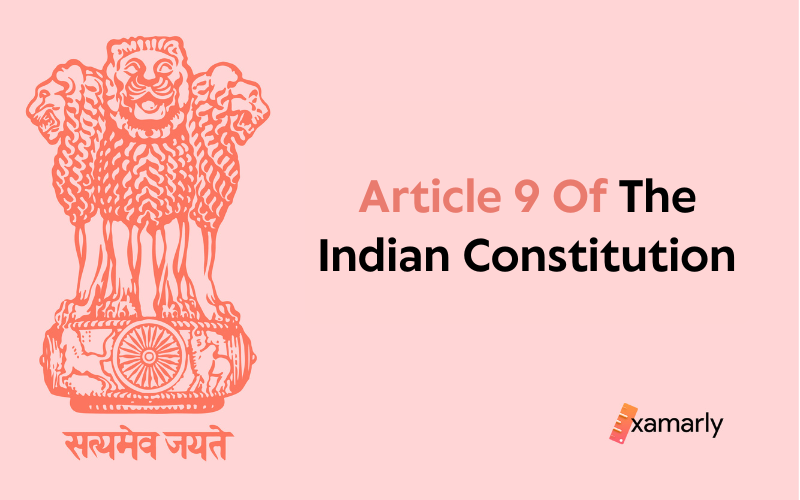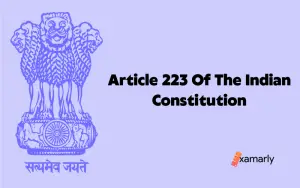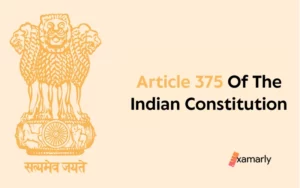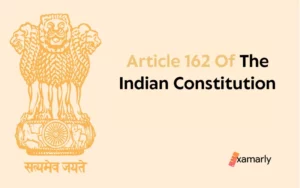Article 9 of the Indian Constitution deals with citizenship and describes the status of people who acquire a residence in another country. After independence, people had the option of acquiring nationality in Pakistan or India. To reduce confusion about when one turned into a foreign national in a foreign country such as Pakistan, the Constituent Assembly decided to make strict provisions relating to the cessation of rights of citizenship of India when acquiring foreign citizenship by choice.
This article will be beneficial for UPSC Exam preparation. This article is a part of Indian Polity section covered under the UPSC Syllabus.
- What Is Article 9 Of The Indian Constitution?
- Explanation Of Article 9
- What Is The Constitutional Provision For Citizenship?
- Article 6 Of The Indian Constitution
- Article 7 Of The Indian Constitution
- Article 8 Of The Indian Constitution
- Article 10 Of The Indian Constitution
- Article 11 Of The Indian Constitution
- Citizenship Act 1955 Of The Indian Constitution
- Conclusion
What Is Article 9 Of The Indian Constitution?
Article 9 of the Indian Constitution can be worded as:
“Person voluntarily acquiring citizenship of a foreign State not to be citizens. No person shall be a citizen of India by virtue of Article 5, or be deemed to be a citizen of India by virtue of Article 6 or Article 8 if he has voluntarily acquired the citizenship of any foreign State.”
This article refers back to articles 5,6 and 8 of the Constitution. It redefines one of the various aspects of citizenship subject and pronounces the validity of laws on citizenship. An Indian citizen will have to face a loss of Citizenship of India if he/she takes foreign citizenship. The Constituent Assembly debated on the inclusion of this article in the constitution on the 10th, 11th, and 12th of August in 1949.
Not given the status of a distinct, independent Article, it was proceeded upon as a proviso to the Draft of Article 5. However, after consequent revisions, the Drafting Committee decided on its status of being placed as a distinct article. Thus this article gained the status of being a general principle, unrestricted by the conditions of Article 5. The direct takeaway from this article is the prohibition of dual citizenship in the Constitution of India.
Only one member of the Constituent Assembly voted against the proceeding of this article. He opined that only those countries which prohibit Indian citizens to have their citizenship and Indian Citizenship simultaneously should receive this treatment from India. Later on, this proposal was voted against by a majority, without any further debate.
Explanation Of Article 9
In the Indian Constitution, Article 9 deals with citizenship. Citizenship in India is defined as the status of a person “(a) who was born in the territory of India; or. (b) either of whose parents were born in the territory. of India; or. (c) who has been ordinarily resident in the territory of India for not less than five years immediately preceding such commencement.”
When India gained independence, the subcontinent was divided into India and Pakistan. There was legitimate traffic and confusion among people, especially who resided in the border region, to choose which country to be a citizen of. Thus, article 9 of the constitution was conceived.
Indian citizens who took the citizenship of any foreign country by exercising their own free will shall not be considered Indian citizens anymore. The individual/s will face termination of citizenship, implying that he/she will no longer enjoy the rights of citizenship including political rights, civil rights, and Fundamental rights. He/she will also lose possession of voter cards. He/she cannot contest elections anymore though they may be a full-age and capable person. In such a case, the relevant provisions relating to articles 5, 6, and 8 are also nullified.
In 1971, the court meted out in the State vs Rehmatullah case that the Central Government is eligible to take legal action against a person who has acquired a foreign country’s citizenship before giving up his/her Indian citizenship.
What Is The Constitutional Provision For Citizenship?
Articles 5 to 11 of the Indian Constitution are informative articles in defining the nuances of the various aspects of Indian citizenship. They make a compilation of the laws determining valid citizenship.
The term citizenship means full membership of a state or community, including rights and responsibilities. Citizenship is a legal relationship that requires a person to be loyal to a nation and to be respectful of its values.
Citizenship is a right that belongs to every citizen of India. It cannot be taken away by force or without reason. However, the Government of India retains the right to terminate citizenship, provided that it follows the correct procedure and follows the Indian constitution.
Article 6 Of The Indian Constitution
Rights of citizenship should be granted to those citizens who were residents of India originally but went to Pakistani territory and returned to India and thereafter continued to reside in India. In such a case, the person must have come to India after July 19, 1948. The person will be registered as a citizen only if he stays in the territory of India for a six-month continuum starting from his date of application. In this case, provisions in Article 5 will be suspended.
To know more about Article 6 Of The Indian Constitution, visit the linked article.
Article 7 Of The Indian Constitution
This article also holds a particular reference to the migrants from Pakistan. People who were originally residing in India but went to Pakistan after March 1, 1947, and later returned to India and settled, were given Indian Citizenship after lawful registration, provided that they had a permit for resettlement and permanent return issued already.
To learn more about Article 7 Of The Indian Constitution, visit the linked article.
Article 8 Of The Indian Constitution
It regulates citizenship rights of Indian people residing outside India. Any individual born in India if residing in a different country now can acquire Indian citizenship by law, provided he/she was registered as an Indian citizen by the diplomatic or consular representative of India in that country. The process is valid even if the person’s parents/grandparents were born in India and even if the case took place before the time of commencement of the Constitution of India. Provisions of Article 5 will be overlooked in this case and applications from citizens residing outside India ordinarily will be taken into consideration.
To know more about Article 8 Of The Indian Constitution, click on the linked article.
Article 10 Of The Indian Constitution
Every person who is or is deemed to be a citizen of India will continue being an Indian citizen and having voting rights and other types of rights allowed to a citizen unless the provisions of any law made by the parliament affect the original laws of citizenship.
Article 11 Of The Indian Constitution
The Parliament retains its power in making amendments to citizens article, which would lead to alteration of the present conditions of citizenship relating to termination provision, citizenship by default, citizenship by renunciation, and so on, as and when required. In other words, the Parliament is free to do a different interpretation of articles and change provision with respect to citizenship as the need arises. In such a case, a previous citizen ceases to claim Indian Citizenship, due to the amendment to article.
Citizenship Act 1955 Of The Indian Constitution
The Citizenship Act 1955 of the Indian constitution governs the process of acquiring citizenship in India. It also sets the conditions under which citizenship may be renounced or terminated. The laws for acquiring citizenship are
- Citizenship by birth
- Citizenship by descent
- Citizenship by registration
- Citizenship by naturalization
- Citizenship by incorporation of territory.
The Citizenship Act of 1955 lists laws in the termination of citizenship. Article 11(a) and (b) cover the details of such a case. 4 ways of loss of citizenship are listed as per the act of 1955 and these are:
- Renunciation Provision: when the Citizenship is renounced by a citizen of India.
- When a citizen loses citizenship by termination if he/she is found guilty of fraud, misrepresentation, or concealment of material facts.
- When the subject is found to be disloyal to the Constitution of India. The list of instances of disloyalty includes words and acts of disgrace.
- When the citizen has been ordinarily residing outside India for 7 years continuously.
This act even gave provisions for overseas citizens with OCI cards. If a person holds OCI card for as long as 5 years, then the card holder can apply for Indian citizenship and thereby get an Indian passport. However, the card applicant should not descend from a line of Pakistani or Bangladeshi citizens. After the Citizenship Amendment Act of 2015, the term overseas citizen of India was replaced by Overseas Citizen of India Cardholder.
The Citizenship Act was amended in due course in 1986, 2003, 2005, 2015 and 2019
Conclusion
Citizenship in India can be acquired through birth, descent, registration, or naturalization. The process is outlined in the Citizenship Act 1955. There is no provision for dual citizenship as clarified by Article 9 of the Indian Constitution. Initially, Article 9 was a part of Article 5 of the Constitution. Later on, to assert its importance in general, it was elevated to the status of a separate article.
Article 9 should be studied along with the other articles and subsequent amendments which throw light on citizenship. Indian Citizenship has been redefined time and again from the time of independence. After various court rulings with references to persons of different origins, further clarity was attained regarding citizenship by birth, citizenship of refugees, and so on.






